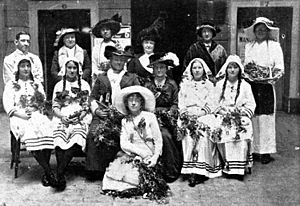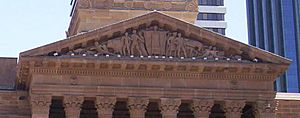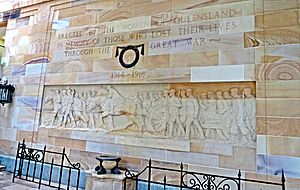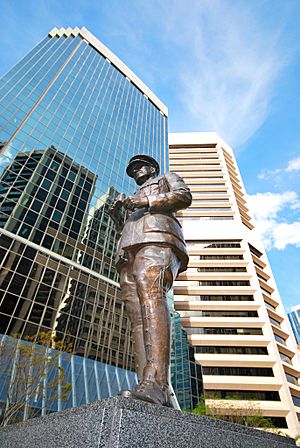Daphne Mayo facts for kids
Quick facts for kids
Lilian Daphne Mayo
|
|
|---|---|
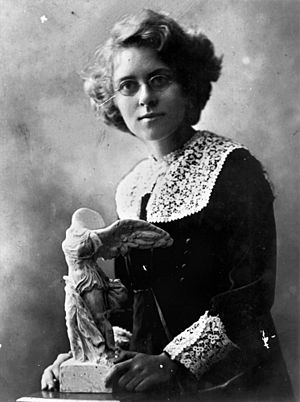
Daphne Mayo
|
|
| Born | 1 October 1895 |
| Died | 31 July 1982 (aged 86) |
| Nationality | Australian |
| Known for | Public sculptures |
| Parent(s) | Lila Mary and William McArthur Mayo |
Daphne Mayo (born October 1, 1895 – died July 31, 1982) was an important Australian artist. She was especially famous for her amazing sculptures. Her most well-known works include the large sculpture above the entrance of Brisbane City Hall and the Women's War Memorial in Anzac Square. She was also awarded the MBE for her contributions.
Contents
Early Life and Art Training
Daphne Mayo was born in Balmain, Sydney, in 1895. She went to school in Brisbane at St. Margaret's Anglican Girls School. In 1913, she earned a special diploma in Art Craftsmanship. This was from the Brisbane Central Technical College.
At college, her teacher L.J. Harvey really inspired her. He helped her discover her love for sculpting and modelling. In 1919, she got a scholarship from the Queensland Wattle League. This allowed her to travel to London. There, she worked as an assistant sculptor. Later, she was accepted into the Sculpture School of the Royal Academy.
Famous Sculptures
Daphne Mayo was a small person, but she created many huge and difficult sculptures. She often carved them right where they would stay. After returning to Brisbane in 1925, she made several important artworks.
Brisbane City Hall Tympanum
One of her most famous works is the tympanum at Brisbane City Hall (1927–1930). A tympanum is a sculpted panel above a doorway. This one shows the "progress of civilisation in Queensland." It is considered one of the most important sculpture projects in Brisbane's history.
Queensland Women's War Memorial
The Queensland Women's War Memorial (1929–1932) is in Brisbane's Anzac Square. It is a sandstone sculpture showing a military parade. This memorial was special because it was one of the first to show servicewomen. It also highlighted the important role women played in wartime.
The idea for this memorial came from the Brisbane Women's Club in 1929. They wanted to raise money for a bronze panel and a fountain. But they didn't raise enough funds. So, the design changed to a carved stone panel with a water fountain instead.
Other Notable Works
- The Sir William Glasgow Memorial (1961–1964) is a lifelike bronze statue. It was added to the Queensland Heritage Register in 2004.
- She also created a tympanum for the Holy Spirit Church in New Farm.
Helping the Arts in Queensland
Daphne Mayo worked hard to support the arts in Queensland. She successfully pushed for money for the new Queensland Art Gallery. In 1936, she helped start an Art Reference Library at The University of Queensland. She also served as a trustee for the Queensland Art Gallery from 1960 to 1967. Her personal papers are now kept at The University of Queensland's Fryer Library.
Because of her strong efforts for the arts, she received the Society of Artists' medal in 1938. She was also awarded the MBE in 1959.
Her Lasting Impact
Daphne Mayo's influence continues today.
Daphne Mayo Visiting Professorship
The University of Queensland has an annual event called the Daphne Mayo Visiting Professorship in Visual Culture. Each year, a famous expert visits Brisbane. They talk about new ideas in visual arts and culture. They also give public talks and teach special classes to university students.
Annual Daphne Mayo Lecture
The Annual Daphne Mayo Lecture is also named in her honor. It is presented by the University Art Museum and other groups. This lecture celebrates a leading Australian person who supports the visual arts. There is also an artists' group named after her, called the Friends of Daphne Mayo.
Daphne Mayo Collection
The University of Queensland's Fryer Library keeps the Daphne Mayo manuscript collection. This includes her letters, newspaper clippings, art show catalogs, tools, artworks, photos, notebooks, and diaries.
 | Ernest Everett Just |
 | Mary Jackson |
 | Emmett Chappelle |
 | Marie Maynard Daly |


